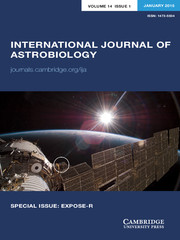Article contents
Cultural evolution, the postbiological universe and SETI
Published online by Cambridge University Press: 26 June 2003
Abstract
The Biological Universe (Dick 1996) analysed the history of the extraterrestrial life debate, documenting how scientists have assessed the chances of life beyond Earth during the 20th century. Here I propose another option – that we may in fact live in a postbiological universe, one that has evolved beyond flesh and blood intelligence to artificial intelligence that is a product of cultural rather than biological evolution. MacGowan & Ordway (1966), Davies (1995) and Shostak (1998), among others, have broached the subject, but the argument has not been given the attention it is due, nor has it been carried to its logical conclusion. This paper argues for the necessity of long-term thinking when contemplating the problem of intelligence in the universe. It provides arguments for a postbiological universe, based on the likely age and lifetimes of technological civilizations and the overriding importance of cultural evolution as an element of cosmic evolution. And it describes the general nature of a postbiological universe and its implications for the search for extraterrestrial intelligence.
Keywords
- Type
- Research Article
- Information
- Copyright
- © 2003 Cambridge University Press
- 83
- Cited by


